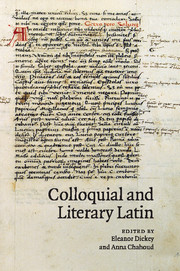Book contents
- Frontmatter
- Contents
- List of contributors
- Acknowledgements
- Foreword (David Langslow)
- PART I THEORETICAL FRAMEWORK
- PART II EARLY LATIN
- PART III CLASSICAL LATIN
- PART IV EARLY PRINCIPATE
- 17 Petronius' linguistic resources
- 18 Parenthetical remarks in the Silvae
- 19 Colloquial Latin in Martial's epigrams
- 20 Current and ancient colloquial in Gellius
- 21 Forerunners of Romance -mente adverbs in Latin prose and poetry
- PART V LATE LATIN
- Abbreviations
- References
- Subject index
- Index verborum
- Index locorum
- References
19 - Colloquial Latin in Martial's epigrams
Published online by Cambridge University Press: 04 April 2011
- Frontmatter
- Contents
- List of contributors
- Acknowledgements
- Foreword (David Langslow)
- PART I THEORETICAL FRAMEWORK
- PART II EARLY LATIN
- PART III CLASSICAL LATIN
- PART IV EARLY PRINCIPATE
- 17 Petronius' linguistic resources
- 18 Parenthetical remarks in the Silvae
- 19 Colloquial Latin in Martial's epigrams
- 20 Current and ancient colloquial in Gellius
- 21 Forerunners of Romance -mente adverbs in Latin prose and poetry
- PART V LATE LATIN
- Abbreviations
- References
- Subject index
- Index verborum
- Index locorum
- References
Summary
INTRODUCTION
Epigram is and was regarded as well down the rankings in the literary hierarchy, and was so regarded by Martial himself: in one of the final pieces of his final book he runs down the literary scale, from epic and tragedy via lyric to satire and elegy, and asks quid minus esse potest?, ‘What can be lower?’; the answer of course is epigram (12.94.9). It is low literature and as such one might expect its linguistic register to be weighted towards the colloquial, as opposed to the literary, end of the spectrum.
Many epigrams, especially those of a satiric or scoptic nature, with which I will be chiefly concerned in this paper, do indeed have evident colloquial characteristics in that they are either framed as dialogues in direct speech, or as one-sided conversations between the author and an addressee (who can be real or fictional, named or not, or simply Martial's public addressed as reader or listener). Hominem pagina nostra sapit ‘my pages smack of mankind’, says Martial (10.4.10), and his poems often describe the situations, interactions and general paraphernalia of contemporary everyday life in vivid and immediate settings. This suggests that the language he uses will be in accord, and will be colloquial in the sense that it is what would have been generally and widely heard in Martial's first-century Latin-speaking world.
- Type
- Chapter
- Information
- Colloquial and Literary Latin , pp. 318 - 330Publisher: Cambridge University PressPrint publication year: 2010
References
- 1
- Cited by



